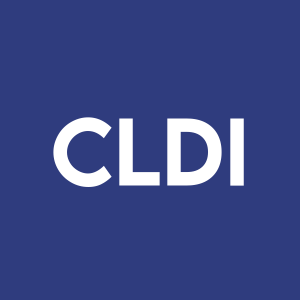Calidi Biotherapeutics Announces Establishment of Scientific Advisory Board to Support Development of CLD-401 and Advance its RedTail Platform for the Systemic Delivery of Targeted Genetic Medicine
Rhea-AI Summary
Calidi Biotherapeutics (NYSE American: CLDI) announced on October 22, 2025 the formation of a Scientific Advisory Board to support development of its RedTail platform and advance lead candidate CLD-401 toward the clinic.
RedTail uses an engineered enveloped vaccinia virus designed to overexpress CD55 to evade immune clearance for systemic delivery. CLD-401 is intended to home to metastatic tumors, replicate selectively in tumor cells, prime local immunity, and express an IL-15 superagonist in the tumor microenvironment.
Positive
- None.
Negative
- None.
News Market Reaction 2 Alerts
On the day this news was published, CLDI declined 5.26%, reflecting a notable negative market reaction. Our momentum scanner triggered 2 alerts that day, indicating moderate trading interest and price volatility. This price movement removed approximately $472K from the company's valuation, bringing the market cap to $8M at that time.
Data tracked by StockTitan Argus on the day of publication.
SAN DIEGO, Oct. 22, 2025 (GLOBE NEWSWIRE) -- Calidi Biotherapeutics, Inc. (NYSE American: CLDI) (“Calidi” or the “Company”), a clinical-stage biotechnology company pioneering the development of systemically delivered, targeted genetic medicines, today announced the formation of its Scientific Advisory Board (SAB) comprised of leading industry and academic researchers in with deep expertise in drug development.
The SAB will work with Calidi to further develop its RedTail platform and advance CLD-401 into the clinic. RedTail is Calidi’s groundbreaking approach to genetic medicines that utilizes an enveloped form of vaccinia virus genetically engineered to overexpress CD55 and avoid immune clearance, allowing for systemic delivery and targeting of genetic medicine payload(s) to sites of disease.
CLD-401, the first lead from the RedTail platform, is designed to home to metastatic sites after systemic administration, replicate only in tumors cells, induce an immune priming event at the tumor site, and express high levels of IL-15 superagonist in the tumor microenvironment, a potent cytokine that induces NK and T-cell responses to the tumor.
“We are excited to have such an internationally esteemed group of advisors working with the company,” said Eric Poma, Ph.D., CEO of Calidi. “We believe their insight and experience will help guide the efficient development of CLD-401 into the clinic and advance what the utility of the RedTail platform in oncology and beyond.”
Founding members of Calidi’s new Scientific Advisory Board are:
Mace L. Rothenberg, MD, FACP, is a physician-executive with more than 30 years of experience in drug development, translational research, and risk-benefit assessment.
Mace Rothenberg, MD is President and Executive Director of the Museum of Medicine and Biomedical Discovery. His nearly 40-year career has spanned government, academia, industry, and the not-for-profit sector. Prior to his current role, Dr. Rothenberg was Chief Medical Officer of Pfizer from 2019 to 2021, during which time the company developed and received Emergency Use Authorization for Comirnity®, its Covid-19 vaccine. Prior to that role, Mace was Chief Development Officer/Head of Clinical Development & Medical Affairs for Pfizer Oncology. Over the course of 10 years in that role, his organization developed and obtained regulatory approval for 11 new cancer medicines. Prior to joining Pfizer, Dr. Rothenberg was Professor of Medicine at the University of Texas Health Science Center at San Antonio (1991-1998) and Vanderbilt University (1998-2008). Dr. Rothenberg began his career as Special Assistant to the Director, Division of Cancer Treatment at the National Cancer Institute in Bethesda, Maryland (1988-1991).
Dr. Rothenberg received his BA magna cum laude from the University of Pennsylvania, his MD from New York University, his post-graduate training in Internal Medicine at Vanderbilt, and his medical oncology training at the National Cancer Institute. He is a Fellow of the American College of Physicians, the American Society of Clinical Oncology, and the New York Academy of Medicine.
Mace serves as a director of Tango Therapeutics, Surrozen, and Aulos Biosciences. He is chairman of the board of Chiara Biosciences. He also serves on the board of several non-profit organizations including the Pancreatic Cancer Action Network (PanCAN), NashBio, and the Councils of Advisors for the Vanderbilt-Ingram Cancer Center and Vanderbilt University School of Medicine Basic Sciences.
Dmitriy Zamarin MD, PhD, is a medical oncologist and Section Head of Gynecologic Medical Oncology and Co-Director of the Center of Excellence for Gynecologic Cancer and a world leader in virotherapy for cancer.
Dr. Dmitriy Zamarin is a member of the Icahn Genomics Institute and the Precision Immunology Institute at The Tisch Cancer Institute at the Icahn School of Medicine at Mount Sinai. Prior to Mount Sinai, Dmitriy spent a decade as a faculty and Translational Research Director in Gynecologic Medical Oncology at the Memorial Sloan Kettering Cancer Center before transitioning to his current role in September of 2023.
Dr. Zamarin has served as a principal investigator and a translational chair on multiple institutional and cooperative group clinical trials exploring novel immunotherapy combinations in gynecologic cancers and other solid tumors and serves as the translational research co-chair on the NRG Oncology Cervical Cancer committee. In the laboratory, his research uses mouse models to explore the mechanisms of tumor-immune system interactions and to develop novel therapeutics, with particular focus on oncolytic viruses, vaccines, and targeted therapies. For his work Dr. Zamarin has received awards and funding from multiple organizations including Damon Runyon Foundation, Ovarian Cancer Research Alliance, Department of Defense, and R01 grants from the National Cancer Institute.
John Wrangle, MD, MPH, is a thoracic oncologist and scientist and an expert in translation immunotherapy with extensive experience around IL-15-based treatment in metastatic cancer
Dr. John M. Wrangle is Associate Professor of Hematology/Oncology at the Medical University of South Carolina (MUSC) and holds the SmartState Burtschy Family Distinguished Endowed Chair in Lung Cancer Research. He is a thoracic medical oncologist focused on developing novel immunotherapy and gene-based strategies for non–small cell lung cancer and other thoracic malignancies.
Dr. Wrangle completed his internship and residency in Internal Medicine at Emory University, followed by fellowship training in Hematology and Medical Oncology at Johns Hopkins University. He is board certified in Internal Medicine and Medical Oncology.
In his clinical-translational work, Dr. Wrangle led the Phase 2 trial combining PD-1 checkpoint blockade with the IL-15 superagonist ALT-803 (now known as N-803), demonstrating tumor responses in patients with non–small cell lung cancer (Lancet Oncology, Wrangle et al. 2018).
Dr. Wrangle also leads efforts to translate lab discoveries into clinical trials, with recent support from the Department of Defense Lung Cancer Research Program to pursue gene-therapy–inspired cancer strategies. He is deeply committed to reducing disparities in lung cancer care in underserved populations in South Carolina, aiming to bring cutting-edge therapies to patients outside major academic centers.
David T. Curiel, MD, PhD is a world leader in cancer immunotherapy and cancer virotherapy.
Dr. David T. Curiel is a tenured Professor in the Cancer Biology Division of the Department of Radiation Oncology at Washington University School of Medicine in St. Louis. Dr. Curiel earned his MD from Emory University in 1982 and subsequently completed his internship and residency in internal medicine at Emory.
Dr. Curiel’s research has centered on engineering viral vectors for gene therapy, virotherapy, and vaccine development, with an emphasis on improving tumor targeting, immune evasion, and durable therapeutic effects. His oncolytic virus efforts include translation toward clinical trials in glioblastoma, among other cancers.
During the COVID-19 pandemic, Dr. Curiel collaborated in developing a nasal vaccine delivered via adenovirus that elicits mucosal and systemic immunity; this vaccine has been licensed for development and has achieved regulatory authorizations in India. He has been recognized with innovation awards for this work.
In recognition of his contributions to viral vector–based therapeutics and translation, Dr. Curiel was elected a Fellow of the National Academy of Inventors. He is also a co-founder of biotech companies (e.g. DNAtrix, Precision Virologics) focused on translating gene- and virus-based therapies to the clinic.
About Calidi
Calidi Biotherapeutics (NYSE American: CLDI) is a clinical-stage company pioneering the development of targeted therapies with the potential to deliver genetic medicines to distal sites of disease. The company's proprietary Redtail platform features an engineered enveloped oncolytic virus designed for systemic delivery and targeting of metastatic sites. This advanced enveloped technology is intended to shield the virus from immune clearance, allowing virotherapy to effectively reach tumor sites, induce tumor lysis, and deliver potent genetic medicine(s) to metastatic locations.
CLD-401, the lead candidate from the Redtail platform, currently in IND-enabling studies, targets non-small cell lung cancer, head and neck cancer, and other tumor types with high unmet medical need.
Calidi Biotherapeutics is headquartered in San Diego, California. For more information, please visit www.calidibio.com or view Calidi’s Corporate Presentation here.
Forward-Looking Statements
This press release may contain forward-looking statements for purposes of the “safe harbor” provisions under the United States Private Securities Litigation Reform Act of 1995. Terms such as “anticipates,” “believe,” “continue,” “could,” “estimate,” “expect,” “intends,” “may,” “might,” “plan,” “possible,” “potential,” “predicts,” “project,” “should,” “towards,” “would” as well as similar terms, are forward-looking in nature, but the absence of these words does not mean that a statement is not forward-looking. These forward-looking statements include, but are not limited to, statements concerning key milestones, including certain pre-clinical data, planned clinical trials, and statements relating to the safety and efficacy of Calidi’s therapeutic candidates in development. Any forward-looking statements contained in this discussion are based on Calidi’s current expectations and beliefs concerning future developments and their potential effects and are subject to multiple risks and uncertainties that could cause actual results to differ materially and adversely from those set forth or implied in such forward-looking statements. These risks and uncertainties include, but are not limited to, the risk that Calidi is not able to raise sufficient capital to support its current and anticipated clinical trials, the risk that early results of clinical trials do not necessarily predict final results and that one or more of the clinical outcomes may materially change following more comprehensive review of the data, and as more patient data becomes available, the risk that Calidi may not receive FDA approval for some or all of its therapeutic candidates. Other risks and uncertainties are set forth in the section entitled “Risk Factors” and “Cautionary Note Regarding Forward-Looking Statements” in the Company’s annual report filed with the SEC on Form 10-K on March 31, 2025, as may be amended or supplemented by other reports we file with the SEC from time to time. We disclaim any obligation to update any forward-looking statement to reflect events or circumstances after the date of this press release or to reflect the occurrence of unanticipated events.
For Investors:
Dave Gentry, CEO
RedChip Companies, Inc.
1-407-644-4256
CLDI@redchip.com










